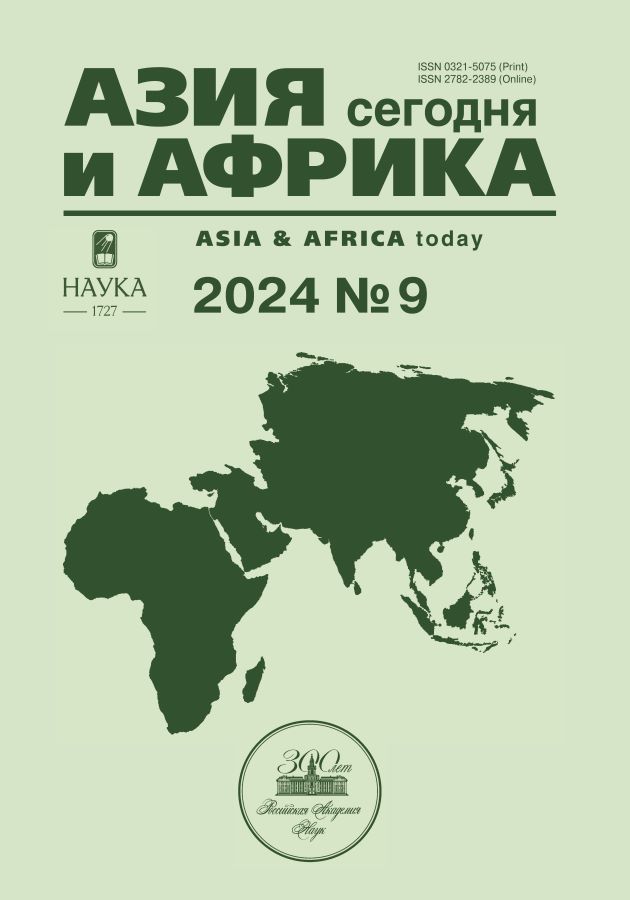Rwanda as Africa’s Rising Center of Power? Three Decades of Post-Genocide Development
- Autores: Denisova T.S1, Kostelyanets S.V1
-
Afiliações:
- Institute for African Studies, Russian Academy of Sciences
- Edição: Nº 9 (2024)
- Páginas: 12-20
- Seção: Politics, economics
- URL: https://rjeid.com/0321-5075/article/view/647447
- DOI: https://doi.org/10.31857/S0321507524090022
- ID: 647447
Citar
Texto integral
Resumo
In April 2024, Rwanda commemorated the 30th anniversary of the Tutsi genocide, which claimed the lives of almost 800 thousand people. The consequences of this tragedy still affect all aspects of the political and economic life of the country, including the relationship between representatives of its two largest peoples – the Tutsi and the Hutu, who strive, although not always successfully, to live in peace and harmony. The government of Paul Kagame is actively promoting the ideology of “Rwandanness”, i.e. blurring the lines between different ethnic groups, and pursues the policy of “national unity”, but selective repression carried out with impunity by security forces and the provision of special preferences to Tutsis in the areas of employment, education, etc. hinder the integration process. Largely due to Western assistance, the regime managed to achieve considerable success in the economic field, although inequality between different groups of the population persists, becoming an important conflict factor. While successfully ensuring its survival through total control, the Kagame regime simultaneously creates the preconditions for problems that future generations of Rwandans may have to face.
Palavras-chave
Sobre autores
T. Denisova
Institute for African Studies, Russian Academy of Sciences
Email: tsden@hotmail.com
ORCID ID: 0000-0001-6321-3503
PhD (History), Leading Researcher, Head Moscow, Russia
S. Kostelyanets
Institute for African Studies, Russian Academy of Sciences
Email: sergey.kostelyanyets@gmail.com
ORCID ID: 0000-0002-9983-9994
PhD (Political Science), Leading Researcher, Head Moscow, Russia
Bibliografia
- Shlenskaya S.M. 2014. Rwanda: 20 years after Genocide. Asia and Africa today. № 5. Pp. 56–59. (In Russ.).
- Elez A.J. 2023. Genocide of the Population of Rwanda in 1994 as an Episode in the History of Neocolonialism. Journal of the Institute for African Studies. № 4. Pp. 59–76. (In Russ.). doi: 10.31132/2412-5717-2023-65-4-59-76
- McDoom O.S. 2022. Securocratic state-building: the Rationales, Rebuttals, and Risks behind the Extraordinary Rise of Rwanda after the Genocide. African Affairs. № 121. Pp. 535–567. doi: 10.1093/afraf/adac031
- Beloff J. The US and Rwanda: How the relationship has evolved since the 1994 genocide. King’s College London, 03.08.2022. https://www.kcl.ac.uk/the-us-and-rwanda-how-the-relationship-has-evolved-since-the-1994-genocide (accessed 02.07.2024)
- Purdeková A. 2008. Building a Nation in Rwanda? De-ethnicisation and its Discontents. Studies in Ethnicity and Nationalism. Vol. 8. № 3. Pp. 502–523.
- Reyntjens F. 2011. Constructing the Truth, Dealing with Dissent, Domesticating the World: Governance in PostGenocide Rwanda. African Affairs. Vol. 110. № 438. Pp. 1–34.
- The Military Balance. L.: Routledge, 2024.
- Denisova T.S., Kostelyanets S.V. 2024. Mozambique: Islamic Radicalization as a Factor of Political Instability. Asia and Africa today. № 5. Pp. 46–55. (In Russ.). doi: 10.31857/S032150750030834-9
- Melvern L. A People Betrayed. The Role of the West in Rwanda’s Genocide. L.–N.Y.: Zed Books, 2009.
- Rieder P. Comparative Reconciliation Politics in Rwanda and Burundi. Doctoral dissertation. Montreal: Concordia University, 2015. https://core.ac.uk/download/pdf/211518279.pdf (accessed 02.07.2024)
- Prunier G. Africa’s World War. Congo, the Rwandan Genocide, and the Making of a Continental Catastrophe. Oxford: Oxford University Press, 2009.
- Muhammad A., Hutami A.N. 2021. Why did Rwanda join British Commonwealth?: Explaining Rwanda’s Foreign Policy. Nation State: Journal of International Studies. Vol. 4. № 1. Pp. 1–17. doi: 10.24076/nsjis.v4i1.454
- Denisova T.S., Kostelyanets S.V. 2023. The DRC: Political Instability and the Rwanda Factor. Vestnik RUDN. International Relations. № 1. Pp. 37–47. (In Russ.). doi: 10.22363/2313-0660-2023-3-1-37-47
Arquivos suplementares










